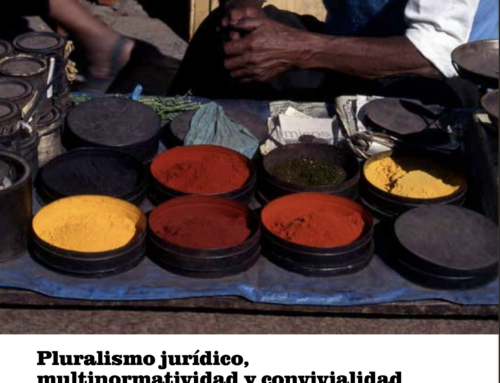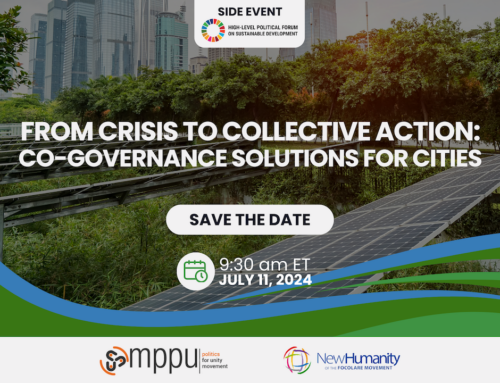Wrote by Annette Pelkmans-Balaoing
Font: Sophia University Institute

Many years ago, in the early 80s, a huge economic crisis exploded in the Philippines. We were young with very little means, but we decided to go to the poorest in our city of Manila in order to help them. This is how Bukas Palad came into being – a social center, which some of you know in Italy because of the immense act of solidarity you have put into motion in order to help it grow. Now, during the pandemic, I went back to the Philippines, through zoom, messenger, WhatsApp, Gmail, Viber .. all these means to go where there is poverty. Because in any crisis situation, those that suffer the most are poor. In the global context, those that suffer the most are the poorest countries, where the health system is not organized and adequately furnished, where governance is not prepared — I speak of governance and not the government because it is not only government agencies, but all of society that shares the responsibility of good governance. And where there is great poverty, there is also great inequalities. This adds pressure, because who have the means to empty out the supermarket shelves, to fully quarantine themselves as protection against the virus? They are the rich, and the more they get for themselves, the less is left for those who are poor. And this is why I ‘flew’ back to the Philippines, through virtual means, in order to seek for ways to help out.
I would want to talk now about the concept of health, first of all as a common good, and later as a global public good. For this, it is truly useful to have the image of a body, the health of a body. When the little finger is wounded, the brains shout out to the whole body: stop! The pair of eyes looks at it, inspects it. The other hand goes out to cradle the hand of the wounded finger, which itself is momentarily paralyzed. The whole body goes out to serve this smallest of fingers.
Our society today is a sick and disintegrated body, but it does everything in its might to deny it, to escape this reality. And then came the coronavirus and made the whole body see just how sick it really is, how disintegrated it really is. It is not unlike a virus that leads to a fever as a sign that there is something in the body that is foreign to its true nature.
The pandemic has revealed the gravity of this disintegration, which is the true malady of society. Our systems – health, economic, social, political – are noninclusive. If a system, which is like a chain of interdependence is weak (and it is weak because it is unable to contain everyone – there is marginalization), it means that it is a system that fails because it is disintegrated.
Talking about the world economy, we now see how this globalization gives an impression of integration. But in reality, it is not, it is merely an illusion. Yes, there is integration, but only among the centers of growth and production. Instead, all the rest who are in the periphery of this global production networks are marginalized, poor. And poverty leads to conflicts, wars, further worsening the extent of poverty.
The pandemic has revealed the enormity of the disintegration, which is the true sickness of the global economy. The phenomenal increase of wealth of a few countries of the world and the inequalities this causes will ultimately lead to the poverty of all.
It is now clear that in general, those who are young and healthy are much more able to weather through the effects of being contaminated by COVID-19. And one is healthy and strong if one has a well-functioning integral physical system. Instead, the fragmentation, disintegration makes us vulnerable and weak. The ageing process, where the cells are no longer able to regenerate themselves, also makes us fragile.
The pandemic has revealed where the fragility of our society lies.
This concentration of production in a few places in the world is not healthy. (Philips’ production of ventilators, for instance, was halted because a tiny component, a sensor, is produced in their factory in the Philippines, closed because of the lockdown.)
This search for a scale of production (as if there is no limit to our natural resource) is not healthy.
This system where information is fragmented is like the blood that is unable to reach the heart which pumps it back to the whole body.
This political system where different political parties are unable to collaborate and act collectively for the public interest is not healthy.
The current socio-economic-political crises we are now seeing are symptoms of the true disease – which is the lack of solidarity. It is as if each part of the body lives only for itself. We also see the importance of leadership in this pandemic. No one could imagine, for example, a human brain that is unable to transmit the right signals to the whole body. A society led by the wrong set of leaders is like a brain that suffers from Alzheimer’s or dementia.
So what is the medicine? What is the vaccine? It is true solidarity.
The global economy, when it is healed from this disease, will be more circular, more inclusive, more just. We might not see the extraordinary growth the world has witnessed in the last few decades, but it will be more sustainable and balanced.
Science, when healed, will be more multidisciplinary. Information will become like water that rushes to the lake to satiate the thirst of all, instead of the likes of Facebook, Google, Huawei, Amazon, Cisco.
But how does true solidarity emerge? Where does the law of nature, which is the same law that governs our physical body originate from? Where does the concept of “us” come from?
It comes from the realization that we are all brothers and sisters, we are just one family. All humanity is one single human race dependent on every single cell or individual for survival.
This is why I returned to the Philippines in this time of the pandemic, even without leaving the comfort of my home in the Netherlands. I went back to my people, my family, who are poor and sick. I am sick with them. I am confused like them.
My survival rests on their survival. Their healing will be mine.
Annette Pelkmans-Balaoing





Leave A Comment